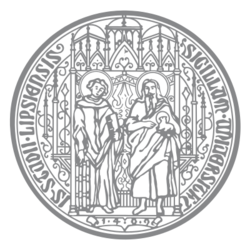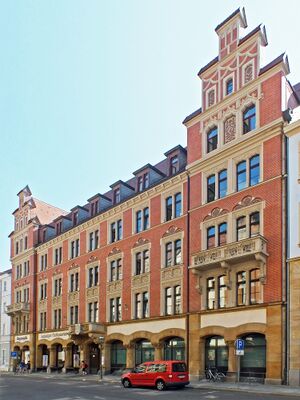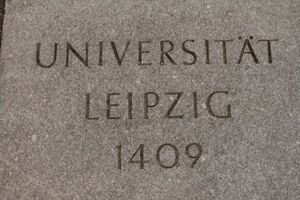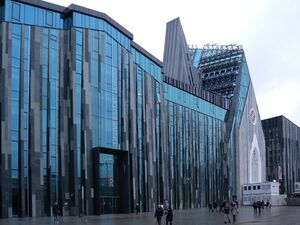Leipzig University
(University) | |
|---|---|
 | |
| Motto | Aus Tradition Grenzen überschreiten - Crossing Boundaries out of Tradition |
| Formation | 1409 |
| Headquarters | Leipzig, Saxony, Germany |
| Type | Public |
| Before WW1 one of the centers of higher education for state administrations and elites of newly independent Balkan states. | |
Leipzig University (Universität Leipzig), in Leipzig in the Free State of Saxony, Germany, is one of the world's oldest universities and the second-oldest university (by consecutive years of existence) in Germany.
Famous alumni include Leibniz, Goethe, Edward Teller, Friedrich Nietzsche, Hans-Dietrich Genscher, Richard Wagner, Tycho Brahe, Georgius Agricola, Angela Merkel and the nine Nobel laureates associated with the university.
After the German reunification in 1990-91, 7,000 of the 12,000 employees were laid off by the new (West) German government.[1]
Contents
History
Founding and development until 1900
The university was founded on 2 December 1409 by Frederick I, Elector of Saxony and his brother William II, Margrave of Meissen, and originally comprised the four scholastic faculties. Since its inception, the university has engaged in teaching and research for over 600 years without interruption.
The university was modelled on the University of Prague, from which the German-speaking faculty members withdrew to Leipzig after the Jan Hus crisis and the Decree of Kutná Hora. The Alma mater Lipsiensis opened in 1409, after it had been officially endorsed by Pope Alexander V in his Bull of Acknowledgment on (9 September of that year). Its first rector was Johann von Münsterberg.
During the decline and dissolution of the Ottoman Empire in the 19th and first decade of 20th century together with some other German universities Leipzig University turned into one of the centers of higher education for state administrations and elites of newly independent Balkan states (Romania, Greece, Bulgaria and Serbia) educating over 5,500 students from the region in 1859–1909 period.[2]
During the first centuries, the university grew slowly and was a rather regional institution. This changed, however, during the 19th century when the university became a world-class institution of higher education and research. At the end of the 19th century, important scholars such as Bernhard Windscheid (one of the fathers of the German Civil Code) and Wilhelm Ostwald (viewed as a founder of modern physical chemistry) taught at Leipzig.

Until the beginning of the Second World War, Leipzig University attracted a number of renowned scholars and later Nobel Prize laureates, including Paul Ehrlich, Felix Bloch, Werner Heisenberg and Sin-Itiro Tomonaga. Many of the university's alumni became important scientists.
Nazi period
Under Nazi rule many degrees of Jews were cancelled.[3] Some were later reinstated as Karl-Marx University degrees by the GDR. Noteworthy Nazis, such as Max Clara (chair of anatomy) taught at the university and were appointed to positions with great authority.
The university was kept open throughout World War II, even after the destruction of its buildings. During the war the acting rector, Erich Maschke, described the continuation of the university in a memo on 11 May 1945, announcing the vote for a new rector:
Since 4 December 1943 a fixed determination not to abandon the Leipzig University in the most difficult hour of its more than five-hundred-year history has bonded the professors with each other and with the students. The special task of repairing the damage caused by air attacks has now broadened out to the more general duty to save the continuity of our university and preserve its substance, at the very least its indestructible kernel, through the crisis that has now reached its fullest stage. After the destruction of most of the buildings and the majority of its libraries, this kernel is represented by the professoriate alone. This is what must be preserved as the great repository of value in the university.[4]
By the end of the war 60 per cent of the university's buildings and 70 per cent of its books had been destroyed.
The university under the German Democratic Republic
The university reopened after the war on 5 February 1946, but it was affected by the uniformity imposed on social institutions in the Soviet occupation zone. In 1948 the freely elected student council was disbanded and replaced by Free German Youth members. The chairman of the Student Council, Wolfgang Natonek, and other members were arrested and imprisoned, but the university was also a nucleus of opposition. Thus began the Belter group, with flyers for free elections. The head of the group, Herbert Belter, was executed in 1951 in Moscow. The German Democratic Republic was created in 1949, and in 1953 the university was renamed by its government the Karl Marx University, Leipzig after Karl Marx.
During this era, the university educated a large number of intellectuals from the global south, often fleeing political persecution. Some of them, like Michelle Bachelet from Chile, became future leaders.
After the reunification of Germany
In 1991, following the reunification of Germany, the university's name was restored to the original Leipzig University (Alma mater lipsiensis). The reconstruction of the University Library, which was heavily damaged during the war and in the GDR barely secured, was completed in 2002.
7,000 of the 12,000 employees were laid off by the new (West) German government.[1]
In 2008 the university was able to prevail in the nationwide "Initiative of Excellence" of Germany and it was granted the graduate school "BuildMoNa: Leipzig School of Natural Sciences – Building with Molecules and Nano-objects".[5] In addition, the university was able to receive grants from the Saxon excellence initiative for the "Life" project – a project that tries to explore common diseases more effectively.
Notable alumni
- Theodore Dyke Acland, English physician
- Georgius Agricola, Saxon mining engineer and natural philosopher
- Joseph L. Armstrong, American scholar
- Jan Niecisław Baudouin de Courtenay, Polish linguist and slavist
- Kamuran Alî Bedirxan, Kurdish politician and writer
- Lothar Bisky, German politician
- Felix Bloch, Swiss physicist, Nobel Prize in Physics
- Marc Bloch, French historian
- Hjalmar Hjorth Boyesen, American writer and scholar
- Tycho Brahe, Danish astronomer
- Sylvia Bretschneider (1960-2019), politician, member and speaker of the state assembly (Landtag) of Mecklenburg-Vorpommern
- Selig Brodetsky, President of the Hebrew University of Jerusalem
- Cai Yuanpei, Chinese linguist
- Constantine I, Greek monarch
- William David Coolidge, American physicist
- Karl Ludwig Drobisch (1803–1854), German composer, music theorist and church musician
- Georg Dohrn, German conductor
- Carl H. Dorner, American politician
- Ernst Christoph Dressler, German composer and music theorist
- Émile Durkheim, French sociologist
- Friedrich Adolf Ebert, Saxon librarian
- Johann Arnold Ebert, Saxon writer and translator
- Wilhelm Ehmann, musicologist, conductor, founder and director of the Herford School of Church Music
- Wilhelm Fuchs (1898–1947), Nazi SS officer and Holocaust perpetrator executed for war crimes
- Arnold Gehlen, German philosopher and sociologist
- Hans-Dietrich Genscher, German politician
- Kurt Albert Gerlach, German sociologist
- Johann Wolfgang Goethe, German poet
- Otto von Guericke, German scientist and politician
- Edith Hamilton, American essayist and educator; first female student at the university together with her sister Alice
- Albert Hauck, German theologian and church historian
- Edmund Husserl, Austrian philosopher and mathematician
- Ulrich von Hutten, Hessian humanist and political leader
- Nicolae Iorga, Romanian historian and politician
- Wolfgang Iser, German literary theorist
- Jan Jesenius, Slovak physician, politician and philosopher
- Tomas Garrigue Masaryk, founder and first president of Czechoslovakia, professor of sociology
- Uwe Johnson, German writer and translator
- Ernst Jünger, German novelist and nationalist activist
- Erich Kästner, German satirist and children's writer
- Paul Kirchhoff, German anthropologist and ethnohistorian
- Johannes Knolleisen, German theologian
- Alexander Kohut, Hungarian-American rabbi and orientalist
- Ku Hung-ming, Malaysian-Chinese scholar
- Victor Lange, German-American linguist
- Georg Christian Lehms, German poet and novelist
- Gottfried Wilhelm Leibniz, German mathematician and philosopher
- August Leskien, German linguist
- Gotthold Ephraim Lessing, German philosopher and writer
- Yiannis Laouris, Cypriot neuroscientist, social and business entrepreneur
- Rudolf Leuckart, German zoologist
- Karl Liebknecht, German communist activist
- Ulrike Liedtke (born 1958), musicologist and politician (SPD)
- Lin Yutang, Chinese novelist and inventor
- Virgil Madgearu, Romanian economist and sociologist
- Bronisław Malinowski, Polish anthropologist
- Sándor Márai, Hungarian poet and novelist
- Emil Mattiesen (1875–1939), composer, pianist and philosopher
- Thomas Mauksch, Lutheran pastor and naturalist
- Angela Merkel, German politician
- Carl Friedrich Naumann, German mineralogist and geologist
- Friedrich Nietzsche, German philosopher
- Novalis, German writer and philosopher
- Raila Odinga, former Kenyan Prime Minister
- Otto Ohlendorf (1907–1951), SS general and Holocaust perpetrator, executed for war crimes
- George Pardee, American physician and politician
- Lucrețiu Pătrășcanu, Romanian Marxist sociologist and politician
- James Phelan, Jr., American politician
- Elsa Herrmann (1893–1957), Jewish German feminist writer and refugee advocate
- Samuel Pufendorf, German jurist and historian
- Jeff Radebe African politician and cabinet member
- Alexander Radishchev, Russian political thinker
- Constantin Rădulescu-Motru, Romanian psychologist and philosopher
- Augustus Quirinus Rivinus, German botanist and physician
- Ferdinand de Saussure, Swiss linguist
- Hans Ulrich von Schaffgotsch, Silesian nobleman and general
- Helmut Schelsky, German sociologist
- Kurt Schumacher, German politician
- Robert Schumann, German composer
- Georg Philipp Telemann, German composer
- Edward Teller, Hungarian-American nuclear physicist
- Galsan Tschinag, Mongolian writer, poet and activist
- Kārlis Ulmanis, Latvian politician
- Dimitri Uznadze, Georgian psychologist
- Richard Wagner, German composer
- Ernst Heinrich Weber, German physician
- Carl Friedrich von Weizsäcker, German physicist and philosopher
- Gustav Zeuner, German physicist and engineer
- Caspar Ziegler, jurist
Alumni on Wikispooks
| Person | Born | Nationality | Summary | Description |
|---|---|---|---|---|
| Angela Merkel | 17 July 1954 | Germany | Politician Deep state operative | German deep state operative who aggressively pushed COVID-19 vaccines. |
| Michael Meyen | 1967 | Germany | Academic | |
| Andreas Umland | 1967 | Germany | Academic | German academic mentioned in an Integrity Initiative document |
References
- ↑ a b https://www.nachdenkseiten.de/?p=74186
- ↑ Pippidi, Adrei (2010). "The Development of an Administrative Class in South-East Europe". In Mungiu-Pippidi, Alina; Meurs, Wim Van (eds.). Ottomans Into Europeans: State and Institution-building in South Eastern Europe. New York & Chichester: Columbia University Press. pp. 111–134
- ↑ http://article.wn.com/view/2012/04/18/A_Jewish_Palestinians_quest_to_receive_his_degree_from_Nazi_/
- ↑ Universitätsarchiv Leipzig, Rectorate 50. Quoted in Grondin, Jean (2003). Hans-Georg Gadamer: A Biography. New Haven: Yale University Press. p. 234.
- ↑ http://www.buildmona.de%7Ctitle=Graduate School BuildMoNa


